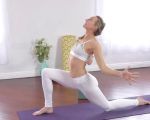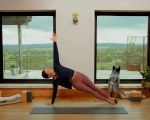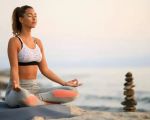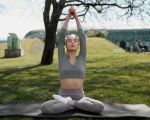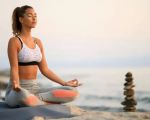Finding Yoga Classes Near Me for Deep Relaxation: A Complete Guide
- 1. Why Choose Deep Relaxation Yoga?
- 2. What to Expect from Yoga Classes for Deep Relaxation
- 3. Benefits of Deep Relaxation Yoga
- 4. Types of Deep Relaxation Yoga Classes
- 5. How to Find Yoga Classes Near Me for Deep Relaxation
- 6. My Personal Experience with Deep Relaxation Yoga
- 7. Conclusion: Why You Should Try Deep Relaxation Yoga
1. Why Choose Deep Relaxation Yoga?
Yoga is widely known for its ability to improve flexibility, strength, and mental clarity. However, one of the most important benefits of yoga is its ability to induce deep relaxation. In today’s fast-paced world, stress is something many of us deal with daily, whether it’s from work, personal life, or societal pressures. Deep relaxation yoga focuses on calming both the body and the mind, offering an opportunity to reset, recharge, and relieve tension.
Deep relaxation yoga practices, often combined with mindfulness and meditation, help individuals achieve a profound state of relaxation, which not only alleviates stress but also promotes overall well-being. Whether you’re a seasoned yogi or a beginner, taking yoga classes specifically designed for deep relaxation can be incredibly beneficial for those looking to reduce stress and improve mental clarity.
2. What to Expect from Yoga Classes for Deep Relaxation
When you attend a yoga class designed for deep relaxation, you can expect to experience a slower pace of practice. These classes often involve gentle, restorative poses that help release tension from the body, combined with deep breathing techniques that promote mental and emotional calm. Classes may be structured around guided meditation, deep breathing exercises, and the use of props such as bolsters, blankets, and blocks to enhance comfort during poses.
Unlike more vigorous yoga practices, deep relaxation classes focus less on movement and more on being present in the moment. Teachers may lead you through a series of restorative poses held for longer durations, allowing you to relax fully and enter a meditative state. The ambiance is typically soothing, with soft lighting, calming music, and aromatherapy used to enhance relaxation.
3. Benefits of Deep Relaxation Yoga
Practicing yoga for deep relaxation provides several health benefits that extend beyond physical flexibility. Here are some of the key advantages:
3.1 Stress Reduction
One of the most significant benefits of deep relaxation yoga is its ability to reduce stress. Through mindful breathing and meditation, yoga helps lower cortisol levels (the body’s stress hormone), which can have a profound impact on mental and physical health. Regular practice helps regulate the nervous system and enhances resilience to stress.
3.2 Enhanced Mental Clarity
Yoga for relaxation focuses on calming the mind and helping you reconnect with yourself. By reducing mental chatter and promoting focus, it helps enhance mental clarity, improve concentration, and provide a sense of inner peace. This clarity can help you make better decisions in your daily life, reducing anxiety and promoting a sense of control.
3.3 Improved Sleep Quality
Deep relaxation yoga can also improve sleep quality. By practicing relaxation techniques before bed, you can calm your nervous system, lower heart rate, and signal to your body that it’s time to wind down. As a result, individuals often experience deeper, more restorative sleep and wake up feeling more rested and energized.
3.4 Enhanced Flexibility and Posture
While deep relaxation yoga may not be as physically demanding as other styles of yoga, it still provides the benefit of improved flexibility and posture. Gentle stretching and restorative poses help release tension in the muscles, increase range of motion, and support better posture, which can alleviate chronic pain or discomfort caused by poor alignment.
4. Types of Deep Relaxation Yoga Classes
There are several types of yoga practices that focus on deep relaxation. These classes can vary in structure and approach, but all of them emphasize calming the body and mind. Here are a few popular styles of deep relaxation yoga:
4.1 Restorative Yoga
Restorative yoga is a gentle practice that uses props to support the body in various poses. Each pose is held for several minutes to encourage deep relaxation, making it ideal for people who want to relieve stress or recover from injury. The slow pace and focus on breathwork help calm the nervous system and promote relaxation.
4.2 Yoga Nidra
Yoga Nidra, also known as "yogic sleep," is a guided meditation practice that induces deep relaxation and mental stillness. In a Yoga Nidra class, you’ll lie down in a comfortable position while a teacher leads you through a body scan, breathwork, and visualization techniques designed to relax the body and quiet the mind. This practice can lead to profound relaxation, often deeper than traditional sleep.
4.3 Hatha Yoga
Hatha yoga focuses on a combination of postures (asanas), breathing exercises (pranayama), and meditation to create a balanced practice. While it can be more active than restorative or Yoga Nidra classes, it still emphasizes slow, deliberate movements and deep breathing, which promotes relaxation and mindfulness.
5. How to Find Yoga Classes Near Me for Deep Relaxation
If you’re looking to experience deep relaxation through yoga, finding the right class near you is an essential first step. Here are some ways to discover yoga classes focused on deep relaxation:
5.1 Use Online Platforms
Online platforms like Free Yoga Links provide a wide selection of yoga classes for deep relaxation. You can search for local yoga studios or find virtual classes if you prefer practicing from home. These platforms often include reviews, class descriptions, and instructor profiles to help you find a class that matches your needs.
5.2 Visit Local Yoga Studios
Many yoga studios offer classes that specialize in relaxation techniques. Whether you’re looking for restorative yoga or Yoga Nidra, local studios often provide a variety of options. Call ahead or visit their websites to find schedules and inquire about specific relaxation-focused classes.
5.3 Ask for Recommendations
If you have friends or family who practice yoga, ask them for recommendations. Word of mouth is often the best way to find great classes and instructors. You can also ask for recommendations on local social media groups or forums dedicated to yoga enthusiasts.
6. My Personal Experience with Deep Relaxation Yoga
As someone who has practiced yoga for years, I can personally attest to the transformative power of deep relaxation yoga. After a particularly stressful period in my life, I decided to try a restorative yoga class. The experience was incredible. The use of props, combined with slow-paced stretches and breathwork, allowed me to fully relax, both physically and mentally.
Yoga Nidra, in particular, has been a game-changer for me. The guided meditation helps me reach a state of deep relaxation that feels even more restorative than sleep. I’ve found that regular practice has helped me manage stress better, improved my sleep, and increased my overall sense of well-being.
7. Conclusion: Why You Should Try Deep Relaxation Yoga
Deep relaxation yoga offers a holistic approach to mental and physical wellness. Whether you're new to yoga or an experienced practitioner, incorporating deep relaxation practices into your routine can help you reduce stress, improve your mental clarity, and enhance your overall health. If you're searching for "yoga classes near me for deep relaxation," there are plenty of resources available, both online and in person, to guide you on your journey.
Visit Free Yoga Links for a range of yoga classes that focus on relaxation and well-being. Whether you’re looking for a restorative class, a Yoga Nidra session, or a gentle Hatha practice, you'll find options tailored to help you relax and recharge.

